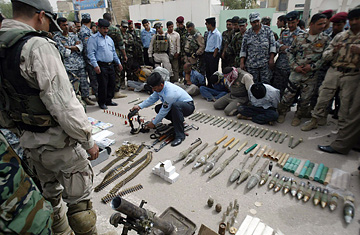
An Iraqi policeman lays out weapons in front of six Shi'ite fighters detained in the holy city of Karbala on April 8, 2008.
Even as General David Petraeus and Ambassador Ryan Crocker made their case on Capitol Hill for maintaining U.S. troop levels in Iraq, a key Iraqi advocate of sending them home was making a power play. Tensions had been high in Baghdad Tuesday morning, in anticipation of a million-strong march against the U.S. occupation called by Shi'ite cleric Moqtada al-Sadr. His Mahdi Army had been engaged in weeks of violent clashes with U.S. and Iraqi government forces in the capital and in the southern city of Basra, and many in the capital feared the worst. But on Tuesday afternoon, Sadr suddenly called off the demonstration, declaring in a statement, "I'm calling on the beloved Iraqi people who are willing to demonstrate against the occupation to postpone this demonstration out of my fear for them and my concern for more bloodshed."
Sadr's announcement came just as cars ferrying worried Iraqis began to clog Baghdad's streets, amid tightened security checkpoints and swirling rumors of an impending curfew. But whether this recent call for restraint will actually ensure calm remains uncertain — Sadr also threatened to call off the Mahdi Army's now defunct cease-fire if attacks by government forces continued. And his response to a demand by Prime Minister Nouri al-Maliki that he disband his militia or face exclusion from the political process was typically ambiguous: Sadr said he would put the matter to Grand Ayatollah Ali Sistani in Najaf, and disband his army if Sistani, the most powerful Shi'ite religious authority in Iraq, ordered him to do so. That may simply have been a maneuver for sympathy on the Shi'ite street; Sistani has previously declined to be drawn on the matter of Sadr's militia, and a Sadr spokesman said Monday that the religious authorities in Najaf had, in fact, "refused" to order him to close down the Mahdi Army.
Despite the cautiously optimistic assessments offered by Petraeus and Crocker, many Iraqis remain pessimistic about the weeks and months ahead. The country is still reeling from the fresh wave of violence brought on by Maliki's disastrous military offensive against Sadr's militia that began in Basra two weeks ago. On Tuesday, Sadr City — the sprawling Baghdad Shi'ite slum that is the capital's largest neighborhood and a stronghold of the Mahdi Army — remained locked down as fighting continued between militia fighters and Iraqi and American forces. Politicians from a number of parties warned of an impending humanitarian crisis.
"Sadr City is suffering," said Fadhila party MP Bassam Sheriff. "There needs to be a humanitarian dimension to this."
Prime Minister al-Maliki escalated his offensive against the Sadrists on Sunday by warning that they would be barred from participating in October's nationwide local elections if they did not disband the Mahdi Army. Although much of the government backed Maliki's statement, even his allies acknowledged it would be an uphill battle. "Let's be realistic, Maliki's main goal is to wipe out the Sadrists before elections because he knows his bloc will lose to them," Alia Nasayif Jasim, a legislator from the secular Iraqi National Accord party, told TIME. "It is impossible to wipe out the Sadrists. If the government is serious, it should dissolve all militias including those linked to the government. If it goes after all the militias equally, the Sadrists will agree to disband."
Some of Sadr's supporters are smug in the face of the Prime Minister's warning. "Maliki couldn't even stop the renewal of the Blackwater contract. How could he disband all the militias?" Fawze Akram, an MP from the Sadrist block, told TIME.
The electoral threat posed by the Sadr movement to the main Shi'ite parties in the current government — the Islamic Supreme Council, and Maliki's own Dawa Party — raises the political incentive for the government to take on the Sadrists before October's vote. But the consequences of the confrontation threaten Iraq's stability. "It is possible that the religious authorities could contain this crisis," said Kurdish MP Bukhari Abdallah Khudur. "If they don't, it will only get worse as elections approach."
Indeed, the Sadrists see themselves as fighting in self-defense, rather than as the aggressor. Or, as Sadrist MP Akram put it, "for every action, there is a reaction."
Sadr himself, who maintains that the United States is the chief enemy, warned in his Tuesday statement, "If the national benefit requires us to unfreeze our army to achieve our goals, we will do so." And with the increasing incursions of Iraqi and American forces into Sadr City and other Mahdi Army strongholds, the cleric will be under growing pressure to act on that warning.
